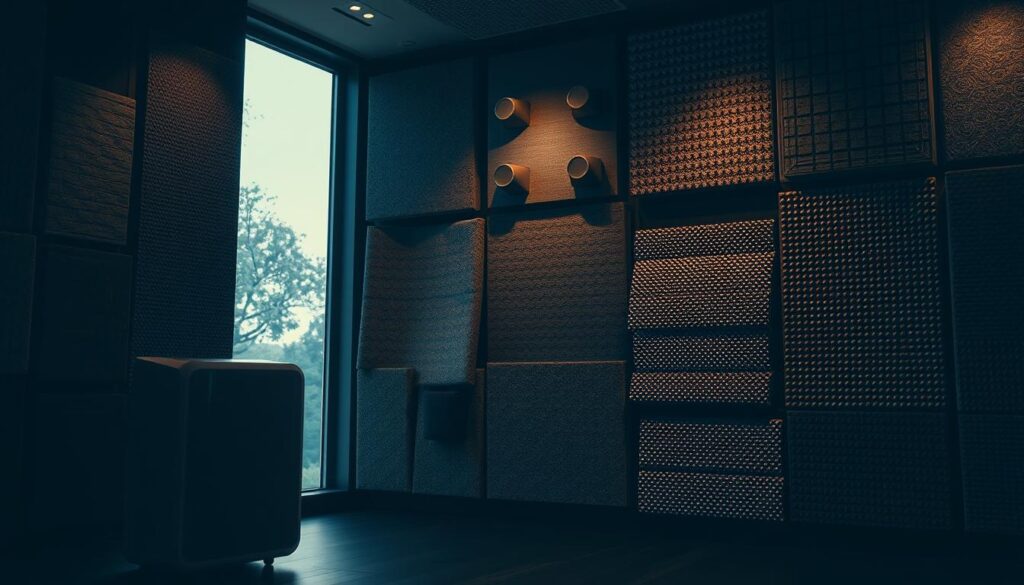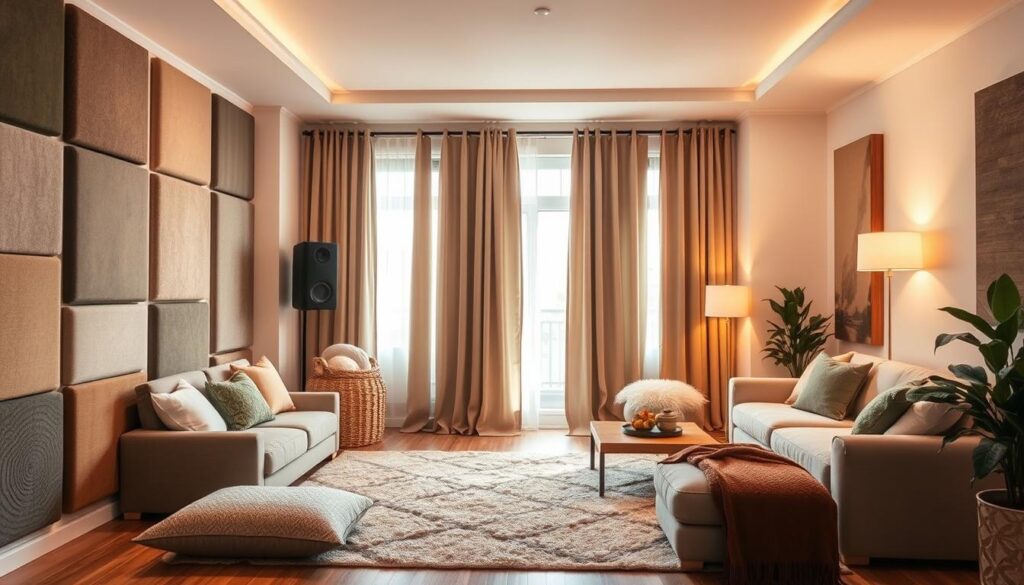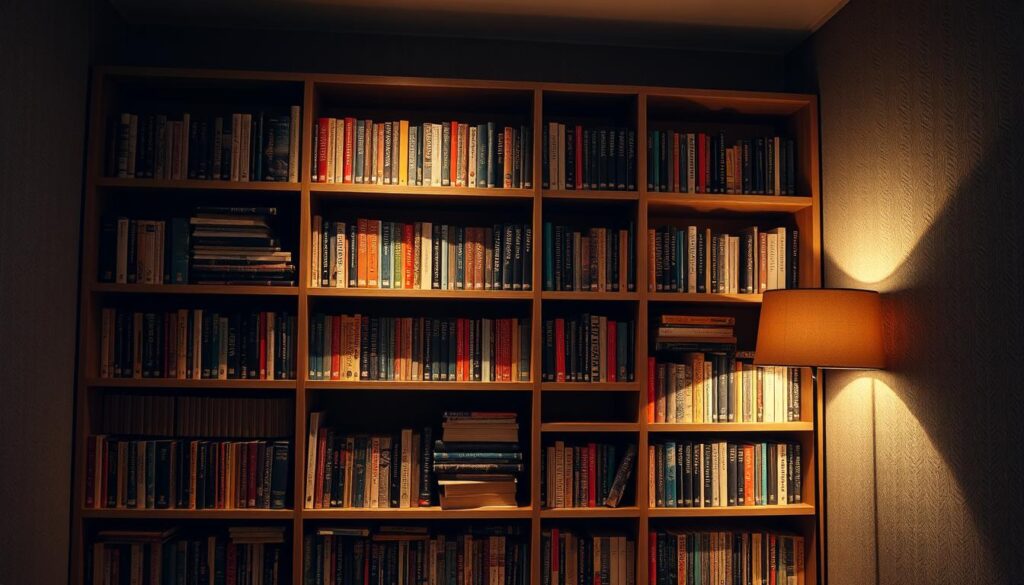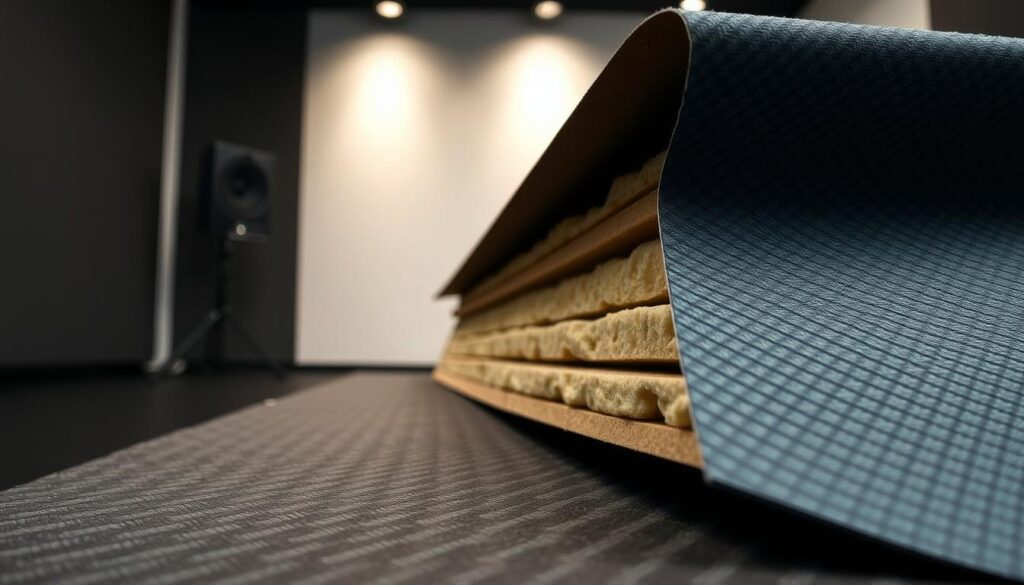As a homeowner, you know how annoying unwanted noise and drafts can be. Summer street noise and winter drafts can make your home feel less cozy. Did you know that up to 30% of home heating and cooling energy usage is lost through windows? This shows how important it is to protect your home from these issues.
Using Noise Reduction Techniques can make your home more comfortable and save energy. It’s about understanding soundproofing and using Soundproofing Solutions in your home. We’ll show you how to do this, so your home stays protected all year.
Understanding the Impact of Seasonal Noise
Your home’s peace is often disrupted by different noises all year. As seasons change, so do the noises that disturb your space. Knowing these changes helps you soundproof better.
Summer brings a big noise problem: summer street noise. More outdoor activities and open windows let in traffic, construction, and party sounds. This noise can really mess up your home’s calm.
The Effects of Summer Street Noise
- Increased stress levels due to constant noise
- Difficulty sleeping or relaxing in your home
- Reduced overall quality of life
Winter, on the other hand, has its own noise issues, mainly winter drafts. Cold air through gaps and cracks not only wastes heat but also lets in outside sounds. This makes your home less cozy and more noisy.
Winter Drafts and Acoustic Challenges
Winter drafts cause several problems, including:
- Increased energy bills due to heat loss
- Reduced soundproofing effectiveness
- A less comfortable living environment
To fight these problems, focus on weatherproofing for sound and get the right sound control products. This way, you can keep your home quiet all year, making it a more peaceful place.
Understanding seasonal noise and soundproofing your home can greatly improve your life. Whether it’s summer noise or winter drafts, there are ways to reduce these disturbances.
Common Sources of Seasonal Noise Pollution
Finding out where seasonal noise comes from is key to making it less of a problem. As the seasons shift, different noises become louder, disturbing your home’s peace.
External Noise Sources in Summer
In summer, traffic, construction, and outdoor events make more noise. These sounds can really mess up your home’s quiet. Using acoustic barrier materials can help block out these noises.
- Traffic noise from increased summer travel
- Construction noise from ongoing projects
- Noise from outdoor events and gatherings
Winter Noise and Its Sources
Winter brings its own noise problems, like wind, snow, and ice. These can make noise, like the wind or snowplows. Good seasonal noise insulation can lessen these winter sounds.
- Wind noise around windows and doors
- Snowplow noise from nearby streets
- Ice formation and related noises
Knowing where seasonal noise comes from helps you soundproof your home. This way, you can enjoy a quieter home all year.
Choosing the Right Soundproofing Materials
Finding the right soundproofing materials is crucial for a quieter home. It’s not a one-size-fits-all solution. You need to think about your home’s unique challenges, like the type of noise and your climate.
Acoustic Panels for Warm Months
In warm months, street noise and neighborhood sounds can be a problem. Acoustic panels are a great Soundproofing Solution for these issues. They absorb sound waves, cutting down on echo and reverberation in your home.
When picking acoustic panels, look at their thickness, material, and where to place them. Thicker panels or those with higher density are better at absorbing low-frequency sounds. You can put them on walls or ceilings, depending on where the noise is most.
Weatherstripping for Cold Weather
When it gets cold, gaps and cracks around doors and windows let in cold air and noise. Weatherstripping is a simple yet effective way to seal these gaps. It makes your home more energy-efficient and quieter. Pick weatherstripping that’s durable and fits the gaps you’re sealing.
- Check doors and windows for gaps.
- Choose the right weatherstripping for your needs.
- Apply weatherstripping to seal gaps and reduce noise.
By picking the right soundproofing materials, you can greatly reduce unwanted noise. This makes your home more comfortable, whether it’s summer street noise or winter drafts. There’s a soundproofing solution for every need.
Seasonal Upgrades to Your Home’s Insulation
Seasonal upgrades to your home’s insulation can make it soundproof and energy-efficient. As seasons change, insulation keeps your home comfy. It keeps it warm in winter and cool in summer, and reduces noise.
It’s key to know the right insulation for each season. You can look into fiberglass, cellulose, and spray foam. Spray foam, for example, seals gaps well and keeps heat in.
Insulation Types for All Seasons
Insulation types vary by climate and need. For example:
- Fiberglass Insulation: A budget-friendly choice for many climates.
- Cellulose Insulation: Good for the environment and noise reduction.
- Spray Foam Insulation: Offers top thermal resistance and seals gaps well.
Picking the right insulation depends on your climate and soundproofing needs. For more on insulation and soundproofing, visit https://aboveallinsulation.net/the-role-of-insulation-in-soundproofing-your-home/.
Steps to Improve Your Home’s Insulation
Improving insulation involves several steps:
- Assess Your Current Insulation: Look for gaps, damage, or not enough insulation.
- Seal Gaps and Cracks: Use caulk or spray foam to seal gaps around windows, doors, and openings.
- Add Insulation: Add insulation to your attic, walls, or floors, based on your home’s needs.
- Use Acoustic Barrier Materials: Use materials that block noise.
By following these steps and picking the right insulation, you can boost your home’s comfort and energy use. Upgrading insulation is a smart move that saves on energy bills and makes your home quieter.
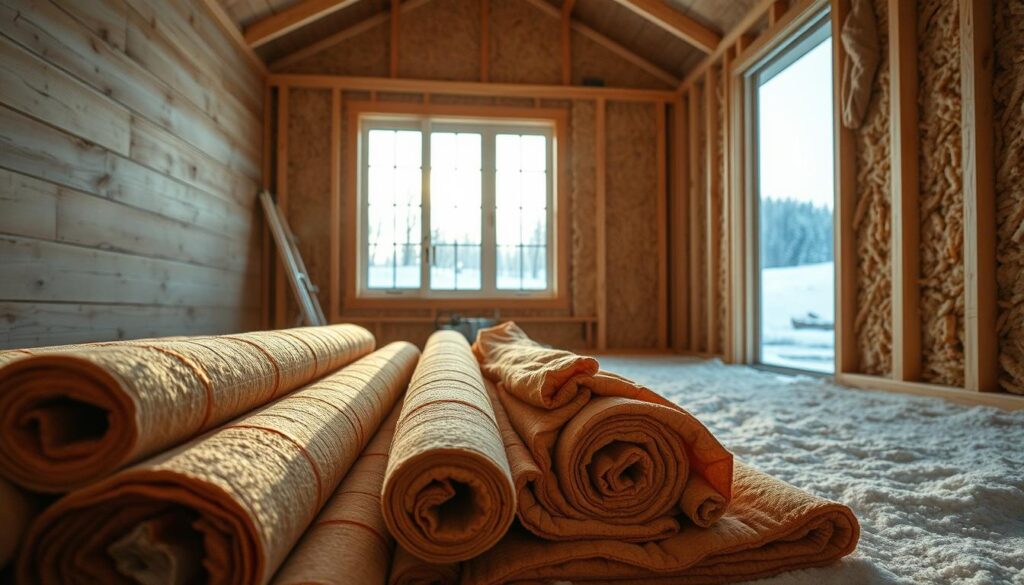
Methods to Block Out Summer Noises
Summer noise pollution can really affect your life, making it key to soundproof your home. As it gets hotter, outside noise increases. This comes from things like lawn mowers, cars, and neighbors.
Using Soundproof Windows
Installing soundproof windows is a top way to keep out summer sounds. These windows act as a shield against outside noise. They make your home quieter and more peaceful.
They work by using special glass and frames that soak up sound waves. This stops them from getting into your house.
The perks of soundproof windows are:
- Less noise pollution
- Better energy use
- More comfort
Strategic Landscaping for Noise Reduction
Soundproof windows aren’t the only solution. Strategic landscaping also helps cut down summer noise. Planting trees, shrubs, or other plants around your home can block noise. The kind and density of plants matter a lot for how well they block sound.
| Type of Foliage | Noise Reduction Effectiveness | Maintenance Level |
|---|---|---|
| Dense Trees (e.g., Oak, Maple) | High | Medium |
| Shrubs (e.g., Boxwood, Holly) | Medium | Low |
| Grasses (e.g., Tall Fescue) | Low | Low |
Using soundproof windows and smart landscaping together can greatly reduce summer noise. This makes your home a quieter, more relaxing place.
Winter Soundproofing Techniques
Winter makes it harder to keep your home quiet. But, there are ways to soundproof your home. As it gets colder, a warm and quiet place is more important. The right soundproofing can greatly improve your home’s comfort and save energy.
Sound-Reducing Curtains
Using sound-reducing curtains is a simple yet effective way to soundproof your home in winter. These curtains block cold air and outside noise. Thick, heavy curtains can keep the cold out and reduce noise. For the best results, pick curtains made for soundproofing.
Sealing Gaps in Doors
Sealing gaps in doors is another key soundproofing technique for winter. Gaps let cold air in and warm air out, making your home less efficient and more noisy. Sealing these gaps with weatherstripping or door sweeps stops cold drafts and noise. This small step can greatly improve your home’s soundproofing and energy use. For more tips on making your home quieter and more comfortable, visit Soundproof Spaces.
| Soundproofing Technique | Benefits | Implementation Tips |
|---|---|---|
| Sound-Reducing Curtains | Reduces external noise, provides insulation against cold air | Choose dense, heavy materials; hang close to windows |
| Sealing Gaps in Doors | Prevents cold drafts, reduces noise entry points, improves energy efficiency | Use weatherstripping or door sweeps; inspect doors regularly |
The Benefits of Soundproofing Your Home
Soundproofing is more than just cutting down on noise. It’s about making your home a better place to live. By choosing Soundproofing Solutions, you can make your living space more comfortable and private.
Enhancing Comfort and Privacy
Soundproofing boosts comfort and privacy in your home. It reduces outside noise and keeps inside sounds in. This makes your home quieter and more peaceful.
This is great for homes in noisy areas or for those who work from home. They need a quiet spot. Sound Control Products help achieve this quiet.
Energy Efficiency Through Soundproofing
Soundproofing also makes your home more energy-efficient. It seals gaps and uses soundproofing materials. This keeps your home warmer in winter and cooler in summer.
This makes your home more comfortable and saves on energy bills. It also means you don’t need to heat or cool your home as often. Materials that block sound and keep heat in make your home more energy-smart.
DIY Soundproofing Solutions
Seasonal soundproofing doesn’t have to be expensive. DIY solutions are a great alternative. With simple and affordable steps, you can cut down on noise in your home all year.
Simple Projects for Summer
Summer is a great time to fix outdoor noise problems. Sealing gaps and cracks around windows and doors with weatherstripping or caulk is effective. It also keeps your home cooler by stopping air leaks.
- Use acoustic panels or sound-absorbing materials on walls and ceilings to minimize echo and reduce external noise.
- Plant dense foliage or install a sound barrier fence to block noise from neighboring properties.
Winter DIY Soundproofing Tips
Winter brings its own soundproofing challenges, like drafts and cold air leaks. To fight these, use thermal curtains or heavy drapes to keep warmth in and cold out. Also, apply weatherstripping around doors and windows to seal gaps.
| DIY Project | Benefits | Cost |
|---|---|---|
| Sealing gaps with weatherstripping | Reduces noise and prevents air leaks | $10-$50 |
| Installing thermal curtains | Keeps warmth in and cold out, reduces noise | $50-$100 |
| Using acoustic panels | Minimizes echo, reduces external noise | $20-$100 |
By adding these DIY soundproofing ideas to your home, you can make it quieter and more comfortable. This is true no matter the season.
Professional Soundproofing Services
For homeowners looking for Soundproofing Solutions, knowing when to call experts is key. DIY methods can work, but sometimes, professional help is needed for the best results.
A soundproofing consultation can guide you on the right path. It helps figure out the best Sound Control Products and how to install them for your home.
When to Consider Expert Help
You might need professional soundproofing if:
- DIY methods didn’t work for you
- You face complex soundproofing issues, like special architecture or loud noises
- You’re starting a new construction or big renovation
- You want soundproofing that fits perfectly with your home’s design
Professional services offer a custom solution for your soundproofing needs. They help make your home quieter and more relaxing.
What to Expect from a Soundproofing Consultation
In a soundproofing consultation, expect a detailed look at your home’s sound issues. The expert will:
- Check your home’s sound challenges
- Suggest good soundproofing options, including Sound Control Products
- Give a clear plan for how to do it, including costs and time
Knowing what a soundproofing consultation covers helps you make smart choices. It leads to a quieter, more peaceful home.
Maintaining Your Soundproofing Installations
Keeping your soundproofing in top shape is key. It helps your home stay quiet and comfy. Regular upkeep keeps your soundproofing working well.
Understanding Seasonal Noise Insulation is important. Different seasons bring new challenges to your home’s sound quality.
Seasonal Inspections
Seasonal checks are a smart move. They catch problems early, keeping your home peaceful.
- Look for wear on acoustic panels and other materials.
- Check doors and windows for gaps or drafts.
- Make sure all soundproofing materials are working right.
Repairing Common Issues
Even with regular checks, problems can pop up. Knowing how to fix common issues saves time and money.
Issues like damaged Acoustic Barrier Materials or loose seals need quick fixes. Fixing these problems fast keeps your soundproofing effective.
- Replace damaged panels or materials.
- Seal gaps around doors and windows to stop sound leaks.
- Update weatherstripping for a tight seal.
Follow these tips to keep your soundproofing in great shape. This ensures a comfy and energy-saving home.
Local Resources for Soundproofing
To soundproof your home well, you need the right tools and advice. Local resources offer both professional help and DIY solutions. They help you achieve your soundproofing goals.
Professional Help at Your Doorstep
Local soundproofing experts can give you expert advice and services. They’ll check your home and suggest the best ways to reduce noise. Look online or in local directories to find them.
DIY Soundproofing Kits and Materials
For DIY fans, online kits and materials are available. You can find things like acoustic panels and weatherstripping. These can help cut down noise and save energy. Choose materials that fit your soundproofing needs.
Using local resources can make your home quieter and more comfortable. You can pick between professional help or DIY. Either way, you’ll get a quieter home, better energy use, and more privacy.
